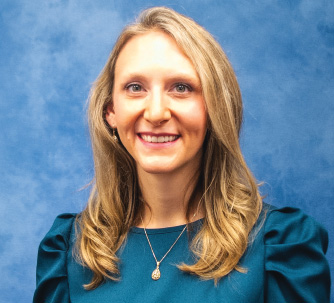Associate Professor, WVU School of Medicine;
Faculty, CAMC Institute of Academic Medicine
By Arianna Whitehair
Jess Luzier, Ph.D., ABPP, CEDS-S, has dedicated her life to bettering the lives of others. As an associate professor with the West Virginia University (WVU) School of Medicine, a faculty member with the Charleston Area Medical Center (CAMC) Institute of Academic Medicine and a licensed clinical psychologist working in the CAMC Behavioral Medicine and Psychology Department, her passion for driving change in the Mountain State is evident.
Having earned her bachelor’s degree at Hiram College in Ohio and her master’s and doctorate degrees from Ohio University, Luzier eventually made her way to West Virginia.
“I fell in love with West Virginia instantly,” she says. “The patients and families I serve are the strongest, kindest, most resilient, hardworking and earnest people.”
After studying abroad in Tanzania during her time as an undergraduate student, Luzier was enthralled by the major role nutrition plays in human behavior.
“I have always been fascinated by the intersection of health, cognition and behavior, so clinical psychology was a natural fit,” she says. “Furthermore, I love working with children and families, and this niche area of behavioral medicine is so greatly under-resourced.”
In her current position at CAMC, she works tirelessly with her team to provide the best quality care for patients battling various mental health disorders.
“I work on a specialty team to provide dialectical behavior therapy for adolescents, which is an intensive, life-saving treatment for youth who struggle with severe emotional dysregulation, including self-harm behaviors, mood problems and eating disorders,” she says.
In addition to this, Luzier is also the co-founder and clinical director of the Disordered Eating Center of Charleston (DECC), which offers interprofessional team treatment of eating disorders. Her greatest career challenge involves the severe lack of available resources for patients with these disorders, and she hopes that the services offered by the DECC will ease this burden.
“I will not relent until every person who needs care for an eating disorder in West Virginia can access the care that is most likely to help them, offered by a team of professionals with highly specialized skills,” she says.
Along with helping her patients obtain peak mental and physical health, Luzier also prioritizes and advocates for mental health awareness.
“My advocacy role helps me to stay focused on my goal of increasing access to specialty care for more people with eating disorders,” she says. “I provide outreach to clinicians in West Virginia and across the nation through consultation and trainings. I also remain in contact with elected officials and other people in decision-making positions to encourage fair and equitable access to necessary care for our patients.”
One of the most fulfilling parts of her job is mentoring colleagues within the WVU School of Medicine campus and the CAMC Institute of Academic Medicine and teaching others how to provide the best possible health care.
“Mentoring and teaching are very rich and important areas of my career,” she says. “I have the privilege of meeting with medical students before they even begin to practice independently, offering them important insights to ensure they are best prepared to address patients with behavioral health conditions in their career.”
Luzier serves as the associate editor for The Specialist publication of the American Board of Professional Psychology and holds volunteer positions with the Academy for Eating Disorders and the International Association of Eating Disorder Professionals. She was also the former president and state government affairs chair with the West Virginia Psychological Association (WVPA).
For influencing how society views and treats mental health disorders, Luzier has been awarded the WVPA/American Psychological Association (APA) Citizen Psychologist Award for her outreach and clinical work in the DECC program; the APA Karl Heiser Award for Advocacy; and was named a Fellow of the APA in 2022.
Motivated by the desire to see her patients thrive, Luzier continues to fight for a brighter future for health care in the Mountain State.
“The patients and families I treat are so special to me,” she says. “I love the culture in West Virginia, and I have so much hope for our future.”
Disordered Eating Center of Charleston
Launched in the summer of 2010 by Jess Luzier, Ph.D., ABPP, CEDS-S, and Stephen Sondike, M.D., FAAP, FSAHM, the Disordered Eating Center of Charleston (DECC) is an interprofessional outpatient treatment program for both children and adults with eating and feeding disorders.
“Within a year of DECC’s inception, I broadened my career focus to not only provide the very best care to people who are impacted by eating disorders but also to train as many providers as possible in the specialized, best-practice, evidence-based treatments that give our patients the greatest chance of recovering,” says Luzier. “I did this by creating a network of providers, managing a free listserv and chairing an annual conference for clinicians of all types. I also doubled down on my commitment to advocate for our patients at the state and national level to ensure that insurance barriers did not prevent them from accessing the treatment they need.”
Team members of the DECC include psychologists, social workers, physicians and a registered dietitian. In order to provide the best care, the team meets weekly to discuss patient progress and review current research on the best, evidence-based treatments for clinical eating disorders.
Over the last decade, they have provided outreach to schools, teachers and clinicians in training. Luzier has also hosted workshops on disordered eating for local educators and clinicians to raise awareness of the urgency of this problem in the Mountain State.
For the DECC, spreading awareness surrounding eating disorders and committing to preventing them are top priorities.




